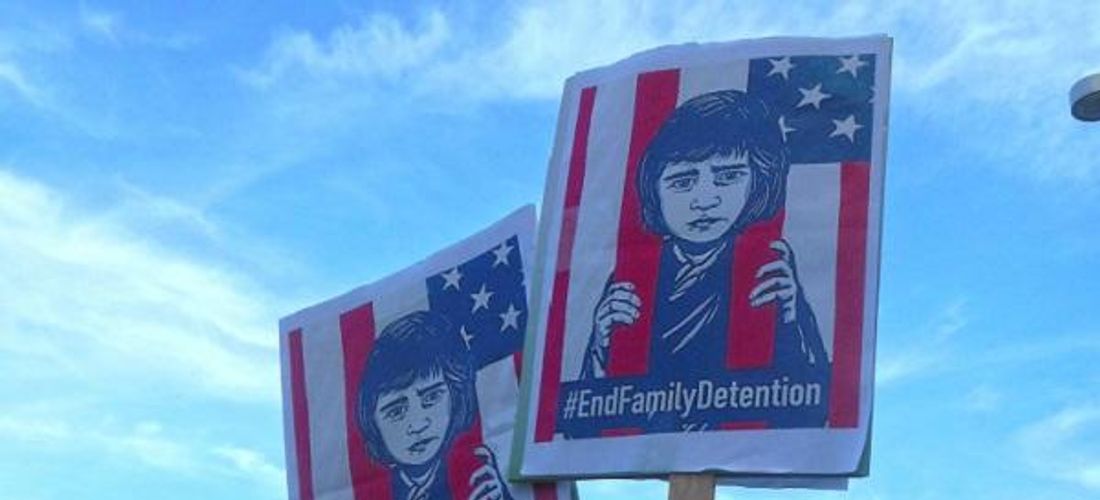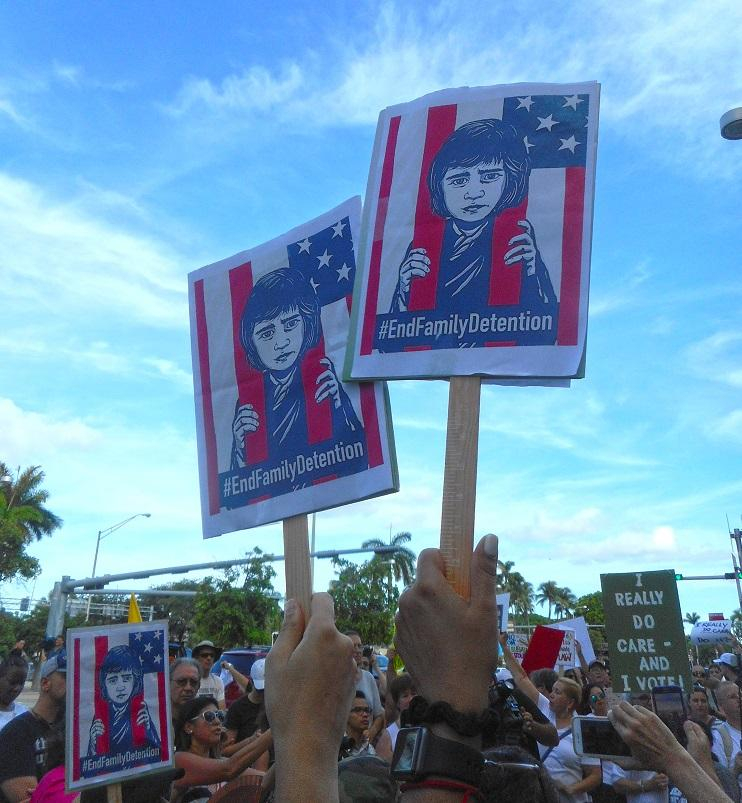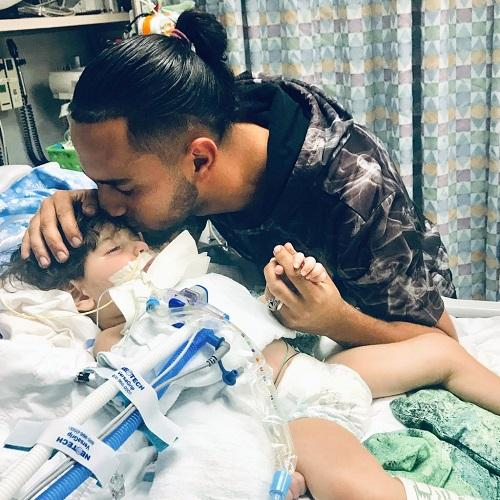The hashtag #closethecamps has trended on and off for weeks, with images of children wrapped in thin mylar “blankets,” soiled toddlers crying for their parents and stories of teenagers wiping away the snot of children on their shirts flooding our news and social media feeds. All this after investigators and a group of lawyers reported finding kids in horrific conditions in Border Patrol facilities (or “concentration camps”) managed by the Custom Borders Control.
Last week investigators and lawyers visited a facility in Clint, Texas as part of the Flores settlement, which allows lawyers to investigate whether safety and sanitary conditions are being met for unaccompanied children at the borders. They found that children were in overcrowded rooms, some sleeping on the cement floors, with little to no hygiene products. They also found older children were taking care of younger ones. In addition, there were untreated lice and flu outbreaks. Adding insult to injury, Department of Justice lawyer Sarah Fabian argued in June that towels and toothbrushes weren’t necessarily needed for safety and sanity.
A year ago a picture of Imam Omar Suleiman pressing his hand to a child’s hand on a bus allegedly moving migrant children to a facility went viral. He was visiting the Ursula Border Patrol Processing Center in McAllen, Texas with a group to try and inspect the facility, which housed more than 1,000 children as of last June, according to an NBC report. While the group was unable to confirm whether the bus was filled with migrant children, Imam Suleiman said there were little children mouthing words to him as he blew kisses at them to give them hope.
He recounted what he saw to The Muslim Vibe: “With these kids, they’re looking at you through these windows, they’re staring you in the eyes, they’re shouting but the glass is completely soundproof.” In a Facebook live video, he also shared what he saw there that day and recounted it later to Now This. The holding facilities for “unaccompanied alien children,” are temporary spaces where children are not to be held more than 72 hours before being placed into homes or alternative housing by the Department of Health and Human Services. Vox reported, as many as 2,000 children are sitting in these facilities daily. Investigators found that some children are there for days and weeks on end. PBS reported that many of these children were reclassified after being separated from their families upon arrival rather than crossing over as unaccompanied minors. This was ruled unconstitutional, as reported by The New Yorker: “In the Ms. L case that was brought last year, when children were being routinely separated by their parents, that judge ruled that these children need to be kept with their parents, that family integrity is a constitutional right and is being violated.” Many of the children also have relatives with legal status in the U.S. or can legally seek asylum once coming here, according to domestic and international laws. But that doesn’t matter, as thousands of children are being held indefinitely in horrible circumstances.Activists allege the Trump administration is deliberately mistreating the children. Rep. Alexandria Ocasio-Cortez (D-NY) dubbed the holding facilities as concentration camps, due to one of the facilities being a former camp for Japanese-Americans and the nature of how the children are being held and treated.Muslims are also affected by the family separation laws that govern our borders, not just to the south but in the north as well. Early on in Trump's presidency, the Muslim Ban created similar waves of anxiety and panic as families were and are being ripped apart, as seen in the case of Shaima Swileh, who was unable to see her dying son for a year until the Council on American Islamic Relations (CAIR) filed a visa waiver on her behalf.This particular case was a rare win for peoplewho were from one of the six banned countries at the time and being prevented from traveling. Some people even reported being stranded while en route to the U.S. due to the timing of the initial ban and how it was being executed on the ground.
Shaima spoke about her difficulties obtaining legal travel documents to be with her dying son at the State of Union address following her son Abdullah Hassan’s death. (Abdullah is seen here with his father to the right) She only had eight days with him prior to health complications from the genetic degenerative brain disease hypomyelination that took his life. Huffington Post translated the interview here from Arabic. Shaima said, families need to be together, especially in times of happiness and hardship. She said, “There isn’t a single American who would agree to live in a country where they have a sick child and their spouse is in another country. No one would want to live like this, American or any other nationality. Families must be together during times of happiness and during times of illnesses.”Keeping a family together is a basic human right that is recognized internationally. So many of us are outraged and appalled by what’s happening and may think there is nothing we can do to fight this. However, there are things you can do to voice your objection and protest from right where you are. Part of the reason Shaima was granted a travel waiver was due to widespread media coverage and outrage by people who shared Abdullah’s story online.
Here are seven things we can do to help families being separated and children at the border:1. Educate yourself on the ongoing conditions of the Border Control facilities. The New York Times put out a list of suggested action items about the current state of affairs at the borders and what can be done.
2. Contact your lawmakers. Demand them to give answers and to stop the inhumane treatment at the borders. Use this guide to find the most effective way to do so. To find your local member of Congress, click here. Ask your state to stop participating with ICE.3. Contact your local
CAIR office. For those affected by the Muslim ban, some chapters are filing waivers for the Muslim ban to reunite families. CAIR also is keeping a database about all ICE raids and is instrumental in informing communities that may be affected. CAIR also provides Know Your Rights trainings, which will better inform you of your rights and how to document and report ICE incidents, as well as other law enforcement relations training. Schedule one for your community today.4. Support organizations like the
ACLU, which are challenging the policies that govern the borders. You can provide monetary or physical support. There are several local chapters across the states. They have "ICE Know Your Rights" information in multiples languages available.
5. Document raids. This is one of the most reported effective ways to stop raids. The group United We Dream has a database to collect information about the raids. You can document raids happening where you live and then email the information to: migrawatch@unitedwedream.org.
6. Donate money to established organizations. The Texas Tribune made a list of organizations working on grassroots level to mobilize people at the Texas-Mexico border. This includes volunteers needed to offer pro bono legal aid, shelters for displaced people and organizations that help post bond and provide food and necessities to asylum seekers. One of these well-known organizations is RAICES, which provides pro bono attorneys on the ground.
7. Spread the word. Sharing accurate information about the cause is one of the basic things you can do to help the children at the border.Whether you’re organizing a Know Your Rights presentation at your local masjid, collecting money to donate to organizations on the ground or providing pro bono assistance to children at the border, taking action is necessary to make a difference. Prophet Muhammad (saw), said, “Verily, the believers are like a structure, each part strengthening the other,” as he clasped his fingers together. It is our responsibility to do our part to unify and strengthen communities and help those who are desperately in need.





